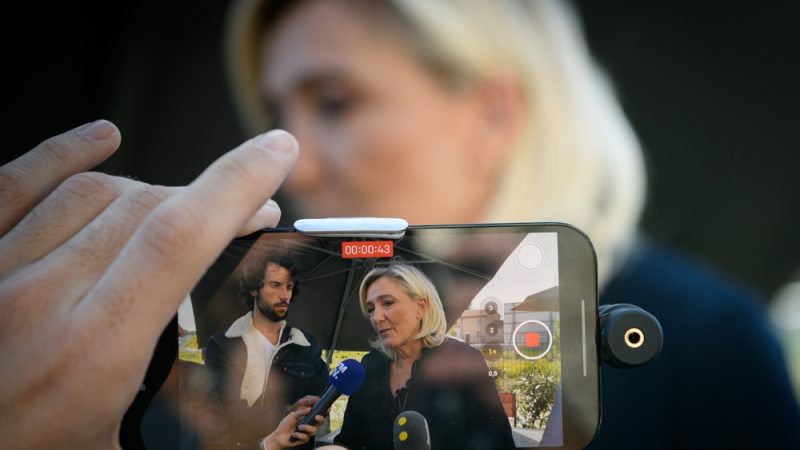
Russian disinformation campaigns are targeting social media platforms to destabilise the French political scene – currently in a legislative campaign – a study by the French National Centre for Scientific Research (CNRS) focused exclusively on X reads.
The study, published on 30 June, identifies some of the Kremlin’s digital disruption strategies during the legislative election campaign.
“Putin’s problem is simple: how do you make political communities opposed to his domination lose elections?” the study reads.
“The Republican front [parties which during election period go against the far-right Rassemblement National as the latter is viewed as espousing anti-Republican values] is the last hurdle before a pro-Putin party comes to power [in France],” David Chavalarias, research director at the CNRS and author of the study, told Euractiv.
“And it is crumbling, undermined by certain short- and long-term actions taken by the Kremlin, such as exploiting the Israeli-Palestinian conflict”, he added.
However, Russia’s use of social media to influence election campaigns is not new.
During the 2016 US presidential elections and during the French presidential elections of 2022, Russian activities such as “intensive astroturfing campaigns” and other “meme wars” aimed at “helping Marine Le Pen win the second round” were spotted.
According to the study, Russia is relying on the Rassemblement National, whose “pro-Kremlin tropism” is apparent from the report of the National Assembly’s committee of enquiry on foreign interference, which heard RN figurehead Marine Le Pen in 2023.
Normalising the far-right and weakening the “Republican front”
Some of the strategies employed by the Kremlin include spreading messages aimed at “normalising the far right”, “ideally until its supporters can claim to reject the prefix ‘extreme’, which is what the RN is doing”, the study also notes.
Another strategy is to weaken the “Republican front”, which during election time is the group of parties that goes against the far-right Rassemblement National as these are viewed as espousing anti-Republican values.
“There are long-term strategies, such as modulating the perception of La France Insoumise (LFI) with the emergence of ‘Islamo-leftism’ — a term, which according to the study was also put forward by the Kremlin —, or delegitimising Emmanuel Macron’s power, via targeted advertising, or even the promotion of fake websites”, the researcher says.
The study also highlighted the fake website, which falsely indicated it was from Macron’s Ensemble movement, that asked visitors to pay €100 to obtain a proxy to vote in the legislative elections.
Though the website is no longer online, it had people believe that Macron’s party was illegally buying votes.
For Chavalarias, there are many such examples, adding that “these operations have become much more productive and effective in recent months, with recent advances in generative AI”.
Wars as an “ideal breeding ground” for the Kremlin
The war in Ukraine and the ongoing war in the Middle East are “an ideal breeding ground” for Russian operations, the study points out.
“The Kremlin is trying to amplify the perception of the horrors of Gaza among supporters of La France Insoumise (LFI) so that the theme of the Israeli-Palestinian conflict takes hold in the legislative elections, with its corollary on the rise of hostile attitudes towards Islam,” the study adds.
The study’s author also believes that “the Kremlin has reinforced the perception of a rise in anti-Semitism and its fear-provoking nature through actions on French territory.”
Examples include the Star of David tags on the walls of Paris in October 2023 and the “red hands” on the Shoah Memorial last May, which, according to ongoing investigations, were commissioned by Russia.
It is then up to the Kremlin’s digital soldiers to amplify these “very real” phenomena, the researcher insists, adding that this forces each camp to “overreact”.
Limited effects?
However, while some commentators, including Macron, have said that such measures encourage voters to move to the far right or abstain from voting to avoid supporting the block opposing Le Pen’s RN, researchers claim that the effect is more limited.
“Research carried out since 2016 on influence tends to suggest that the effect is at best very limited”, Maxime Audinet, a researcher at the Strategic Research Institute at the École Militaire (IRSEM), said on X.
“The question of the reception and effects of this interference is still largely unknown, and there are a number of research projects underway on this subject”, he added.
Chavalarias, for his part, points out that his study was conducted exclusively on X and “cannot reflect the dynamics of control at the national level”.
It is also difficult “to identify causal chains with any certainty unless we use intelligence methods that are beyond the scope of research”, he added.
At the European level, these practices have been used to support other pro-Russian groups, such as Robert Fico’s Smer and the far-right Alternative for Germany (AfD).
“This hybrid war is one of the Kremlin’s main lines of defence and attack in its war against Europe,” the researcher told Euractiv.
“Paying 1,000 people behind a computer will always be cheaper than sending a single bomb to Kyiv”, he added.
[Edited by Daniel Eck/Alice Taylor]
Read more with Euractiv
Subscribe now to our newsletter EU Elections Decoded
This post was originally published on this site be sure to check out more of their content







